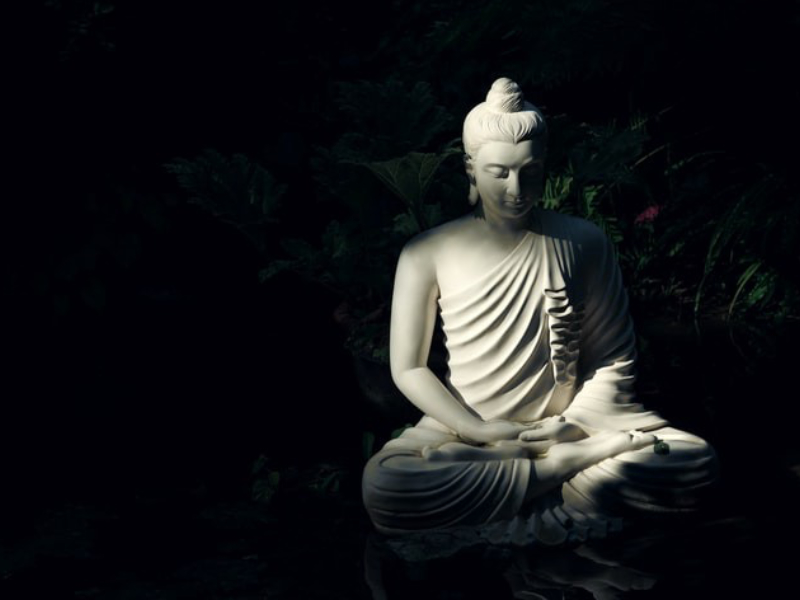Thinking the World Into Being
– Noble Eightfold Path | Thought & Intention –

Thought, together with perception, produces everything. It shapes our words, propels our actions, and establishes our being in the world. It provides a space, a home, a roof, for our sense of self to create, express, live, and love.
Thought takes the seamless and interconnected whole of existence and breaks it into pieces, which can then come into relation to one another. It is in thought that ‘you’ and ‘I’ are born, where ‘you’ and ‘I’ can relate, where ‘we’ can exist in contrast, or in relation, to the world — to the physical world, to the spiritual world, to the social world, to the internal world of feelings and emotions, to the abstract world of art, mathematics, and ideas.
Thought is where it all begins and where it all ends. Relations, dimensions, depth, contrasts, measurements, opinions, judgments, birth, death, space, time, and understanding are all impossible without it.
* * *
Today, as a part of our continued exploration of the Buddha’s Noble Eightfold Path, let’s move into the second set of exercises in our wisdom training, exercises in thought. Remember, in an effort to transform the suffering in the world, the Buddha created a path, the Noble Eightfold Path, which can be broken into three arenas of training: (1) a training in wisdom, (2) a training in ethics, and (3) a training of the mind.
Thought and worldview compose this first arena of training — wisdom. So, when training our thoughts, the goal is wisdom. It is to cultivate thoughts that align with the Dharma, that align with truth, that align with reality. It is to cultivate thoughts that lead to peace, love, happiness, and freedom.
Okay, so what kind of thoughts align with the Dharma? What kind of thoughts lead to more peace, love, and happiness? What thoughts lead to a state of ease and spaciousness and timelessness? What thoughts will set you free?
Let’s consider some practical ways to train our thoughts in pursuit of wisdom.
* * *
Cultivating Thoughts of Goodwill
Today, we’ll just go over some general exercises I think you’ll find helpful. And then I’ll go into some more specific practices, like metta or loving-kindness, generosity, and renunciation practices, in another episode, since there is so much to explore there.
General Thought Exercises
Okay. To begin training in thought, it may be prudent to start by simply noting when you are thinking. Many people, if you ask, would believe they are aware they are thinking. But anyone who has practiced vipassana or another form of meditation knows how untrue this claim is. When we first begin practicing meditation, we quickly discover that it’s hard to watch more than just a few breaths without becoming lost in thought. So, again, a good first step in training our thoughts is simply to cultivate that meta-awareness I spoke about in the article, What is Mindfulness?
Once you get a better hold on the thinking process itself, you may find it skillful to start organizing your thoughts. More specifically, you might find it useful to separate your thoughts into two columns. In the first column: thoughts rooted in ill-will, thoughts of selfishness, greed, hatred, and cruelty. In the second column: thoughts rooted in good-will, thoughts of selflessness, generosity, loving-kindness, and compassion.
When the Buddha explored this delineation, he witnessed directly and understood that thoughts rooted in ill-will led to his own affliction, to the affliction of others, and to the affliction of both. He also realized that thoughts rooted in good-will led to joy, peace, spaciousness, and a sense of connection in himself, in others, and in both.
Again, the Buddha isn’t dogmatic. He doesn’t ask you to take him at his word here. He invites you to explore this in yourself. So, try it out. See if you can train your attention to be placed in both columns, on thoughts rooted in good-will and ill-will. See, feel, and know for yourself (1) the direct felt experience of each of these thoughts and (2) also the immediate and long-term consequences of each of them.
One way to do this, after you’ve noted that a thought has arisen, is to ask whether the thought is helpful or unhelpful? ‘Is this thought skillful or unskillful?’ ‘Is this thought wholesome or unwholesome? or simply, ‘What’s the attitude in the mind right now?’
I do this all the time not only for myself but with my kids. At a holiday party the other night, for example, my oldest kid was getting frustrated and upset he wasn’t winning prizes from a game an adult had set up for the young children. I asked him, “Hey, what’s the attitude in your mind right now?”
“Unpleasant,” he responded.
“Oh yeah, how’s that working out for you?”
“Not good,” he replied.
“Hmm, interesting,” I said.
He quickly settled back into the game. And not more than five minutes later, he decided to give one of the gifts he had won to his younger cousin, who also wasn’t winning as many gifts as the others. Again, I asked him, “Hey, what’s the attitude in your mind?”
“Pleasant,” he said with a big smile.
“Oh yeah? How’s that working out for you?”
“Great!” he exclaimed.
As you become more mindful of your thought patterns and their affects on yourself and others, I think you’ll discover that awareness starts to take care of itself. You will naturally begin to respond from a place of good-will, which leads to more ease and happiness in your life, which then leads to deeper awareness and concentration, which leads to more wisdom and insight, which leads to more happiness and peace. And so your entire life, your entire being, just continues to climb upward.
Additionally, when we are aware of and understand our habitual nature as human beings, we can also support and accelerate the cultivation of those thoughts that lead to more well-being, joy, peace, spaciousness, and connection. The more we repeat specific thoughts, the more probable they become. We can train our thoughts so that the positive, wholesome, loving thoughts become the inclination of our minds.
“What you think and ponder becomes the tendency of your mind.” — the Buddha
And it doesn’t stop here. Our training in wisdom, in our thoughts and sub-conscious worldview and perception, leads to our behaviors and speech in the world. It shapes our morality, our ethical conduct. Explore and know for yourself that your thoughts form your speech and your actions, which harden into habit. And, as the common saying goes, our habits harden into character. So, watch the thought and its ways with care. Let it spring from love born out of concern for all beings.
“Watch your thoughts, they become your words; watch your words, they become your actions; watch your actions, they become your habits; watch your habits, they become your character; watch your character, it becomes your destiny.” — Lao Tzu
Witness, know for yourself, and reflect on how thoughts rooted in ill-will obstruct concentration, insight, and wisdom, how they cause dis-ease and bring difficulties to your life, and how they lead away from nibanna or the highest peace. Make it a disciplined practice to recall and hold clear this understanding in the stillness of your solitude.
And on the other side of this, reflect on and realize directly that thoughts rooted in goodwill — thoughts of selflessness, generosity, renunciation, loving-kindness, and compassion — lead to peace, happiness, satisfaction, and freedom. And again, make it a practice to bring this clearly to mind in the stillness of your being.
* * *
Now, let’s do a quick exercise. Grab a pen and a pad. And then write down, without thinking about it, the first five things that come to your mind to describe the world as you know it.
I’m serious. Write them down.
Okay, now take a look at what you’ve written. Do you think it’s possible your comments tell you more about yourself than they do about the world? Do you think these words or descriptions might be clues about or reflections of yourself rather than true statements about reality? How are you structuring the world? Can you love or hate something about another person or the world unless it is already a part of you?
Try to be conscious of this possibility moving forward. Try considering that every comment you make about the world, about another person, about an event, about life, is a projection of yourself, of your own interior landscape. What if you lived as if others are simply reflections of yourself, as if everything in the world is no more than a shiny mirror to see yourself?
The world gives you what you see. Experiment with this by changing your story about what you see. Notice if the world starts to change.
* * *
In exploring Eastern and Western philosophy, you come to learn that those who grew up under an Eastern frame view the world very differently from those who grew up under a Western frame. Now, of course, there are pros and cons to each. But for those of you like me who grew up in the West, I think these small shifts in your thinking, listed below and found in Deborah Adele’s fabulous book The Yamas and Niyamas, may bring a lot of space and peace to your being. Only you can know, though, so check them out by applying them in your own life.
Western Frame:
- Pursuit of Attaining, Gaining, Accomplishing
- Morality: Right vs Wrong
- Either/Or Mindset
- Moral Rules & Answers
- Mistakes = Failures
Eastern Frame:
- Pursuit of Letting Go, Renunciation, Peace
- Ethics — Motivations Have Consequences; Helpful/Hurtful; Uniting/Divisive; Skillful/Unskillful; Healthy/Unhealthy
- Both/And Mindset
- Moral Questions & Direct Investigation
- Mistakes = Living
“Attainment is so strongly conditioned in the West. We can even find ourselves doing our spirituality as something to be achieved, instead of something we are.” — Deborah Adele
One additional frame I want to highlight that is very common and adds quite a bit of unnecessary suffering to our lives is the comparing frame.
Comparing can be useful, say, when we are looking at hiking boots to buy for our trip to Mount Kilimanjaro or when we are looking at which thoughts bring peace and freedom, like the Buddha. Obviously, some boots will meet our values and needs more appropriately than others. But often we step into the comparing mind when we don’t need to. “This coffee isn’t as good as that one.” And then this mindset bleeds into comparing people: “Lupita Nyong’o is prettier than Zoë Kravitz.” And even ourselves: “River is so much better than me at writing.”
Why do we have to be like that? Why can’t we just say what we like or value about someone or something? And…how does the saying go: ‘If you don’t have something nice to say, don’t say nothing at all.’
Let people and things stand on their own. Tell me about it — whatever it is — rather than compare it to someone or something else. “This coffee is earthy and strong in taste.” “Lupita Nyong has an enchantingly beautiful smile.” “River is an incredible writer. That’s something I’d like to improve in myself.”
“Comparison is the thief of joy” — Common Saying
Stop with the comparing! Let’s stop comparing ourselves, our talents, our gifts, our weaknesses. Let’s stop comparing others, stop comparing our feelings and emotions, stop comparing movies, shows, and music, stop comparing art, comparing our vacations, stories, and experiences. The comparing mind is ceaseless. And for what? What value does it bring you or anyone else?
One last place I’d like to point out where this shows up is in our obsession to ask, especially kids, but really all people what their favorite x is? When we have favorites, or force others to operate in this frame, we automatically diminish the value of everything else. Let’s find some more original and interesting questions to ask.
* * *
Is this frame, thought, or question wholesome or unwholesome? Are you remembering the undivided whole? The preciousness and necessity of each and every aspect of existence?
Conclusion
As the Buddha said, mind is forerunner of all things. When our minds are filled with thoughts rooted in ill-will, suffering and dis-ease will follow. When our minds are filled with thoughts of good-will, with thoughts of love and kindness, peace and happiness will occupy our being.
Take good care of your thoughts,
More Articles
“The Art of Bare Attention”
Today we’re going to talk about the ancient Buddhist practice vipassana, or insight meditation. Now, just to be clear, this is an entirely secular practice. It doesn’t require you to adopt any dogmatic beliefs…
“The Faceless Seer”
How do you hold your love? Do you hold her from stillness, with nowhere to go, with nothing to do? How do you hold your love? Do you hold her with acceptance, with open hands and arms, with unabashed…
“Everything Changes”
It’s no secret everything changes. Your experience this morning isn’t your experience now. Yet how many of us act like we really understand this? How often do we grasp onto the illusion of things…
“The Divine Connection”
How do you hold your love? Do you hold her from stillness, with nowhere to go, with nothing to do? How do you hold your love? Do you hold her with acceptance, with open hands and arms, with unabashed…






